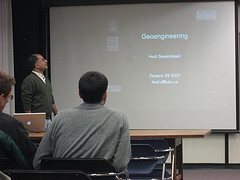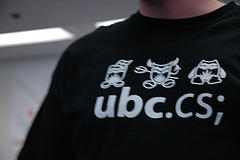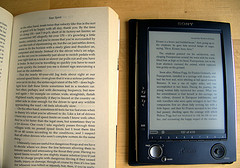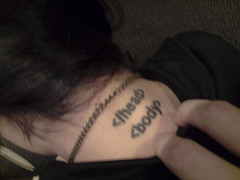May 4th, 2009 by Eugene Barsky | No Comments »

Maclean’s has featured an article last week on geoengineering – http://www2.macleans.ca/2009/04/22/plan-b-for-global-warming/
The article focused on work of David Keith from UofC. His main article on geoengineering – “Geoengineering the climate: History and prospect” can be found here (in full text PDF for UBC folks)
A quick search in Web of Science database shows that every year there are twice as many article on this topic than a previous year…
Here are some folks in UBC Applied Sciences that work in this area
** Photo by freedryk
Posted in Atmospheric Science, Chemistry, Earth and Ocean Sciences, General Science, Geography, Main, Mechanical Engineering, News, Science - undegraduate classes | No Comments »
April 24th, 2009 by Kevin Lindstrom | No Comments »
Canada Excellence Research Chairs – Phase 1 Competition Results
Overview
In 2008, the Government of Canada created a new permanent program to establish 20 prestigious research chairs–Canada Excellence Research Chairs (CERC)–in universities across the country. The CERC program invests $28 million a year to attract and retain the world’s most accomplished and promising minds and help Canada build a critical mass of expertise in the priority research areas of environmental sciences and technologies, natural resources and energy, health and related life sciences and technologies, and information and communication technologies.
Phase 1 Competition Results
The following 17 universities have been invited to compete in Phase 2.
Universities invited to Phase 2 competition
(Number of successful proposals arranged from West to East)
* University of British Columbia (4)
* University of Alberta (5)
* University of Calgary (1)
* University of Saskatchewan (1)
* University of Manitoba (1)
* University of Toronto (5)
* University of Waterloo (4)
* McMaster University (2)
* Queen’s University (1)
* University of Western Ontario (2)
* University of Ottawa (2)
* McGill University (4)
* Université Laval (3)
* Université de Sherbrooke (1)
* Université du Québec à Trois-Rivières (1)
* University of Prince Edward Island (1)
* Dalhousie University (2)
Click here for a list of the successful proposals
Submitted by Kevin Lindstrom Liaison Librarian
Posted in About this blog, Amusing stuff, Atmospheric Science, Chemical and Biological Engineering, Chemistry, Civil Engineering, Earth and Ocean Sciences, General Science, Geography, Main, Materials Engineering, Mathematics, Mechanical Engineering, News, Physics, Podcasts, Science - undegraduate classes, Statistics, Teaching, Uncategorized, Wood Sciences | No Comments »
April 16th, 2009 by Eugene Barsky | No Comments »

Since early April 2009, the access to INIS database has been opened to all Internet users around the world. Free, open and unrestricted access is available from the INIS Homepage, or directly from the following link: INIS Database.
This initiative provides easy access to reliable nuclear information on the peaceful uses of nuclear science and technology, including nonconventional literature, and makes nuclear knowledge readily available worldwide.
Established in 1970, INIS represents the world’s largest database of scientific and technical literature on a wide range of subjects from nuclear engineering, safeguards and non-proliferation to applications in agriculture, health and industry.
Currently, the INIS Database contains over 3 million bibliographic records and almost 200,000 full-text nonconventional documents, consisting of scientific and technical reports and other non copyrighted information.
** photo by clark
Posted in Atmospheric Science, Chemical and Biological Engineering, Chemistry, Earth and Ocean Sciences, General Science, Main, News, Physics, Science - undegraduate classes, Uncategorized | No Comments »
March 13th, 2009 by Kevin Lindstrom | No Comments »
Imagine no facebook, twitter, myspace, email, internet for a entire day?
Shutdown Day is a Global Internet Experiment whose purpose is to get people to think about how their lives have changed with the increasing use of the home computer, and whether or not any good things are being lost because of this.
The idea of Shutdown Day project is simple – just shutdown your computer for one whole day of the year and involve yourself in some other activities: outdoors, nature, sports, fun stuff with friends and family – whatever, just to remind yourself that there still exists a world outside your monitor screen.
For more information, go to Shutdown Day
Submitted by Kevin Lindstrom Science and Engineering Liaison Librarian
Posted in Atmospheric Science, Chemical and Biological Engineering, Chemistry, Civil Engineering, Earth and Ocean Sciences, General Science, Geography, Main, Materials Engineering, Mathematics, Mechanical Engineering, News, Podcasts, Science - undegraduate classes, Statistics, Teaching, Uncategorized, Wood Sciences | No Comments »
March 6th, 2009 by Kevin Lindstrom | No Comments »
The 2009 UPPAC conference takes place on Saturday March 14, 2009 at the Hennings Building here on the UBC Vancouver campus.
The Undergraduate Pacific Physics and Astronomy Conference is the conference where undergraduate students from Western Canada and the Pacific Northwest can share their research, learn about further opportunities for research and education, and meet other undergraduate students. UPPAC features undergraduate research talks, lab tours, a keynote lecture by a distinguished researcher, and lots of opportunities for undergraduate students to network and to explore Vancouver and the UBC campus.
For an example of papers presented at last years conference, have a look at the 2008 UPPAC Conference Proceedings.
Submitted by Kevin Lindstrom Liaison Librarian for Physics and Astronomy
Posted in General Science, News, Physics, Science - undegraduate classes | No Comments »
February 25th, 2009 by Eugene Barsky | No Comments »

The most recent Sci-Bites newsletter from Thomson Reuters reports that UBC CS department has the Highest Impact in Computer Science in Canada, ranked by average citations per paper, among Canadian universities that published at least 50 papers in Thomson Reuters-indexed journals of computer science & engineering between 2003 and 2007.
http://sciencewatch.com/dr/sci/09/feb22-09_2/
Congrats to our CS faculty and students!
** Photo by gillicious
Posted in General Science, Main, News, Science - undegraduate classes, Statistics, Uncategorized | No Comments »
February 19th, 2009 by Eugene Barsky | No Comments »

Our new article – “Comparing Safari Tech Books Online and Books24x7 E-book Collections: A Case Study from the University of British Columbia Library” has just been published this week in the Issues in Science and Technology Librarianship.
It is open access and is available for everyone.
Abstract:
Most academic libraries are seeking to provide electronic access to the very dynamic and changing field of technology related material. Safari Tech Books Online and Books24x7 are the major e-book collections in this area. We compared the Safari Tech Books Online and Books24x7 e-book packages as to their usefulness for the University of British Columbia Library, second largest academic library in Canada. In our sample, we found that Books24x7 had more titles to offer (25% more); the overlap between the collections was relatively small (13-16%) and publishers varied considerably; and although there were no major differences in the “usefulness” measures of the titles in the two packages (Amazon.com ratings, WorldCat holdings and Reviews.com reviews were quite similar for both packages), O’Reilly titles, available only through Safari Tech Books Online, were held by a slightly higher number of libraries worldwide. We conclude that in order to have comprehensive coverage of this constantly changing area of knowledge, a large research academic library needs to subscribe to both collections. If subscribing to both collections is not an option, we recommend selecting a package based on the pricing that the library can negotiate with ProQuest, the vendor of both products, since the collections are complimentary in their nature.
Please feel free to ask us any questions or follow-up with this area of ebooks evaluation.
** photo by Adrian
Posted in General Science, Main, Mathematics, News, Science - undegraduate classes | No Comments »
February 11th, 2009 by Eugene Barsky | No Comments »

A short article from the New Scientist discusses the Financial Times Energy Conference in London last week. It is a pretty interesting short read.
To see UBC researchers work in this area, you could go to Compendex database (a primary engineering database) – http://toby.library.ubc.ca/resources/infopage.cfm?id=715
and type “sustainable energy” as a topic search and UNIVERSITY OF BRITISH COLUMBIA as “author affiliation”
** Photo by Lollie-Pop
Posted in Atmospheric Science, Chemical and Biological Engineering, Chemistry, Earth and Ocean Sciences, General Science, Geography, Materials Engineering, News, Physics, Science - undegraduate classes, Wood Sciences | No Comments »
February 6th, 2009 by Kevin Lindstrom | No Comments »
The University of British Columbia Library and Springer are delighted to introduce a new Print on Demand feature linked to the Library’s eBook collection: MyCopy powered by SpringerLink.
As a current faculty member of the University of British Columbia, MyCopy allows you to order your own personal print copy of a Springer eBook included in the Library’s collection. The individual copy will be delivered as a printed soft cover version directly to your doorstep. Best of all, it will be available to all patrons for just $24.95 (USD plus GST & PST, including shipping and handling costs).
The University of British Columbia Library is one of the first libraries to introduce the MyCopy service that includes more than 11,000 eBooks out of a total of 30,000 eBooks available on SpringerLink. We invite you to take a look, browse this comprehensive eBook collection and take advantage of the MyCopy service.
If you find an eBook that you would like to use for a course, you can simply copy the URL in the address bar on SpringerLink and add this to your course syllabus. The students can then follow the URL and purchase the eBook directly on http://www.springerlink.com for home delivery.
Below are directions for ordering a MyCopy book for just $24.95 (USD plus GST & PST, including shipping and handling costs)
1. Go to SpringerLink: http://www.springerlink.com
2. Search or browse eBooks in your research area (Available titles will have an orange MyCopy label associated with it.)
3. Click on the eBook or eBook chapter of your interest
4. Click on the MyCopy Logo found underneath the eBook or eBook chapter information, or the “add to shopping cart now” link within the orange box on the right hand column to start the ordering process.
We trust you will find this feature a valuable addition to Springer’s eBook collection. If you have questions, comments, or suggestions, please do not hesitate to contact UBC Librarians Joy Kirchner (joy.kirchner@ubc.ca) and Aleteia Greenwood (aleteia.greenwood@ubc.ca) or Springer at http://www.springerlink.com/feedback.
For a complete list of all Springer Ebooks including MyCopy titles go to the Springer eBooks by Subject Collection page and download the Excel spreadsheet for your discipline. Look for the column that contains the Springerlink openurl and paste this url into your browser.
Submitted by Kevin Lindstrom Liaison Librarian for the Physical and Applied Sciences.
Posted in Atmospheric Science, Chemical and Biological Engineering, Chemistry, Civil Engineering, Earth and Ocean Sciences, General Science, Geography, Main, Materials Engineering, Mathematics, Mechanical Engineering, News, Physics, Science - undegraduate classes, Statistics, Wood Sciences | No Comments »
January 15th, 2009 by Eugene Barsky | No Comments »

The US National Security Agency has helped put together a list of the world’s most dangerous coding mistakes.
Experts from more than 30 US and international cyber security organizations jointly released the consensus list of the 25 most dangerous programming errors that lead to security bugs and that enable cyber espionage and cyber crime. Shockingly, most of these errors are not well understood by programmers; their avoidance is not widely taught by computer science programs; and their presence is frequently not tested by organizations developing software for sale.
BBC news article lists the mistakes here – http://news.bbc.co.uk/2/hi/technology/7824939.stm
** Photo by Marco Gomes
Posted in Amusing stuff, Main, Mathematics, News, Science - undegraduate classes | No Comments »






